Cross-strait issues would be among the top items on the agenda in the annual summit of the Inter-Parliamentary Alliance on China (IPAC) to be held in Taipei tomorrow, which would also include a “Taiwan session,” during which President William Lai (賴清德) and Deputy Minister of Foreign Affairs Tien Chung-kwang (田中光) are to deliver speeches.
This would be the first IPAC summit held in Taiwan, and is also the first IPAC summit to be held in a non-member nation, Democratic Progressive Party (DPP) Legislator Fan Yun (范雲) said, adding that this demonstrates that the world supports Taiwan.
Cross-strait stability is one of the highlights on the summit’s agenda this year, with related issues to be discussed by governmental officials and the world’s best experts, sources said yesterday.

Photo: Screen grab from the IPAC’s Web site
Another highlight is cybersecurity, as in March more than 400 e-mail accounts associated with IPAC were attacked by the Chinese hacking group APT31, the IPAC said.
The Ministry of Foreign Affairs in a statement yesterday said that a total of 49 lawmakers and politicians from 23 countries and the European Parliament would take part in the event, including Australian Senator Deborah O’Neill, Czech lawmaker Eva Decroix and French Senator Olivier Cadic.
The IPAC has become even more significant with the rise of party disagreements and political violence, as it is “creating space for consensus across party lines” and facilitates “compromise across the spectrum,” European Parliament Vice-President Pina Picierno was quoted as saying in an IPAC news release published on Tuesday last week.
“Some issues transcend party and geography” and “Taiwan is undoubtedly one of those issues,” she was quoted as saying.
“There has never been a more important time to stand with Taiwan,” British Member of Parliament Tom Tugendhat was quoted as saying in the IPAC news release.
The solidarity demonstrated by the summit shows that “cross-strait stability is high in the minds of lawmakers around the world, from all sides of the political spectrum,” he said.
Meanwhile, sources said the IPAC has expressed hope that Taiwan’s opposition legislators would take part in the event after it learned they might not.
While Taiwan People’s Party Legislator Wu Chun-cheng (吳春城) has said he would attend the summit, Chinese Nationalist Party (KMT) lawmakers had yet to give a positive response as of Saturday, they said.
The IPAC has not granted Taiwan membership, as it requires joint participation by the ruling and opposition parties, DPP Legislator Wang Ting-yu (王定宇) said on Saturday.
The KMT’s opting out of the event for years is because of its fear of displeasing China, he said.
The opposition lawmakers should stand by their country and honor their commitments to parliamentary diplomacy, DPP caucus secretary-general Rosalia Wu (吳思瑤) said.
The opposition should not take the opposite side of democracy, she added.
KMT caucus deputy secretary-general Lin Szu-ming (林思銘) on Saturday said he did not receive any invitation from the IPAC.
KMT Legislator Hsu Chiao-hsin (徐巧芯) also said her office had not received an IPAC invitation to the summit.
Additional reporting by Liu Wan-lin,
Chen Cheng-yu and Li Wen-hsin

Chinese Nationalist Party (KMT) Chairman Eric Chu (朱立倫), spokeswoman Yang Chih-yu (楊智伃) and Legislator Hsieh Lung-chieh (謝龍介) would be summoned by police for questioning for leading an illegal assembly on Thursday evening last week, Minister of the Interior Liu Shyh-fang (劉世芳) said today. The three KMT officials led an assembly outside the Taipei City Prosecutors’ Office, a restricted area where public assembly is not allowed, protesting the questioning of several KMT staff and searches of KMT headquarters and offices in a recall petition forgery case. Chu, Yang and Hsieh are all suspected of contravening the Assembly and Parade Act (集會遊行法) by holding

PRAISE: Japanese visitor Takashi Kubota said the Taiwanese temple architecture images showcased in the AI Art Gallery were the most impressive displays he saw Taiwan does not have an official pavilion at the World Expo in Osaka, Japan, because of its diplomatic predicament, but the government-backed Tech World pavilion is drawing interest with its unique recreations of works by Taiwanese artists. The pavilion features an artificial intelligence (AI)-based art gallery showcasing works of famous Taiwanese artists from the Japanese colonial period using innovative technologies. Among its main simulated displays are Eastern gouache paintings by Chen Chin (陳進), Lin Yu-shan (林玉山) and Kuo Hsueh-hu (郭雪湖), who were the three young Taiwanese painters selected for the East Asian Painting exhibition in 1927. Gouache is a water-based

Taiwan would welcome the return of Honduras as a diplomatic ally if its next president decides to make such a move, Minister of Foreign Affairs Lin Chia-lung (林佳龍) said yesterday. “Of course, we would welcome Honduras if they want to restore diplomatic ties with Taiwan after their elections,” Lin said at a meeting of the legislature’s Foreign Affairs and National Defense Committee, when asked to comment on statements made by two of the three Honduran presidential candidates during the presidential campaign in the Central American country. Taiwan is paying close attention to the region as a whole in the wake of a

OFF-TARGET: More than 30,000 participants were expected to take part in the Games next month, but only 6,550 foreign and 19,400 Taiwanese athletes have registered Taipei city councilors yesterday blasted the organizers of next month’s World Masters Games over sudden timetable and venue changes, which they said have caused thousands of participants to back out of the international sporting event, among other organizational issues. They also cited visa delays and political interference by China as reasons many foreign athletes are requesting refunds for the event, to be held from May 17 to 30. Jointly organized by the Taipei and New Taipei City governments, the games have been rocked by numerous controversies since preparations began in 2020. Taipei City Councilor Lin Yen-feng (林延鳳) said yesterday that new measures by